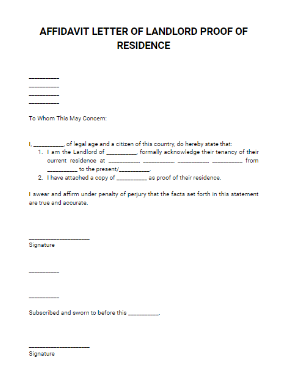- Eviction Notice Forms
- Power of Attorney Forms Forms
- Bill of Sale (Purchase Agreement) Forms
- Lease Agreement Forms
- Rental Application Forms
- Living Will Forms Forms
- Recommendation Letters Forms
- Resignation Letters Forms
- Release of Liability Agreement Forms
- Promissory Note Forms
- LLC Operating Agreement Forms
- Deed of Sale Forms
- Consent Form Forms
- Support Affidavit Forms
- Paternity Affidavit Forms
- Marital Affidavit Forms
- Financial Affidavit Forms
- Residential Affidavit Forms
- Affidavit of Identity Forms
- Affidavit of Title Forms
- Employment Affidavit Forms
- Affidavit of Loss Forms
- Gift Affidavit Forms
- Small Estate Affidavit Forms
- Service Affidavit Forms
- Heirship Affidavit Forms
- Survivorship Affidavit Forms
- Desistance Affidavit Forms
- Discrepancy Affidavit Forms
- Guardianship Affidavit Forms
- Undertaking Affidavit Forms
- General Affidavit Forms
- Affidavit of Death Forms
Residential Affidavit
Have you ever been in a situation where you are asked to provide proof of where you live? Perhaps it was during that time when you had to change school districts, or it was a requirement as proof for court, or maybe it was to verify a deceased person’s residence? Whatever the case may be, an Affidavit of Residence may be the right document for you. You can have your lawyer, landlord or roommate make a sworn statement for you. You could also do it on your own and have it notarized by an authorized officer of the law. Read More

What is an Affidavit of Residence?
An Affidavit of Residence is a legal document used to verify and authenticate your residence or the residency of anyone living in your household. This type of affidavit is often used in response to the request for proof of residency from a school, bank, court, and other institutions. Aside from your own proof of residency, you may also use this to verify someone else’s domicile before they passed away. Before a deceased family member’s accounts and funds are released, institutions like banks and insurance companies, require that you verify the residence of the deceased. Certain attachments such as death certificates, may also be needed.
How to write an Affidavit of Residence in five steps.
Affidavits of Residence are usually requested by different institutions and this means that it serves different purposes. But it doesn’t need genius to create your own Affidavit of Residence. It’s relatively simple and can be done in no time.
Just follow these six simple steps in writing your own Affidavit of Residence.
Think about what it’s all about
Make sure that the template you have or the one you’re crafting from scratch matches the purpose of your affidavit. If it’s for school or bank requirements, it should be indicated in your document. By knowing and understanding what you have to do, you can guarantee that you will follow the basic guidelines when writing one.
Title and caption your affidavit
Once it’s clear what your affidavit is all about, you can start by writing down its title and caption. Indicate what the type of Affidavit of Residence it is–is it for yourself, for your tenant, or for a deceased loved one? Your title should capture what your affidavit is all about. In the caption, you can write down your location and if it has a court case, also include all pertinent details of the case including case title, names of the plaintiffs and defendants, and the case number.
Provide biographical details
Similar to any other affidavits, you should open your affidavit by identifying the affiant. Include personal details such as full legal name, age, marital status and your current address. Since you’ll be attesting to the truthfulness of the facts stated in the affidavit, you must write in the first person.
Write only statements that can be supported by facts
At the beginning of your affidavit, you have to provide a sworn confirmation of the facts that will be stated in it. After that, write down these factual information in plain language and avoid embellished and exaggerated statements or your personal opinion. Make sure that details are written in a chronological order to make essential facts clearer.
Attach relevant documents
Most affidavits of residence have document attachments to further prove your residency. Label all relevant documents that are referenced in your affidavit and number them accordingly. These documents may be utility bills, bank statements, receipts or other documents that have your name and address in it.
Sign your affidavit and have it notarized
In this final step, it is important that you review your statements before having it notarized. Some state laws allow remote notarization of the documents but in most states, they require your physical presence when having your affidavit notarized. This means that you will need to sign your affidavit in the presence of a notary public or with another officer of the law who is authorized to administer an oath.
FAQs
Can I have my lawyer make my Affidavit of Residence?
Yes, you may have your lawyer draft your affidavit. But note that it could cost you more. Affidavits require varying degrees of information and requirements based on the situation they are used for. If it’s not going to be used in a court proceeding, you could draft an affidavit on your own and have it notarized. Unless, otherwise specified.
What does proof of residence mean?
Proof of residence are any documentary requirements that will prove that you live in your residence. This can be an identification card with your name and address on it, utility bills, or other official mails such as bank statements that can prove your address.
Can I have someone else prove my residence on my behalf?
Yes, your landlord, your roommate, and even the company that you work for can attest to your residency and make an affidavit for it. You may talk to them and let them know why you need them to provide a sworn statement for you and what the affidavit is for.
Is an Affidavit of Residence admissible proof of residence?
In cases where you just moved to a new place, it would take months to acquire proof of residence. If this is your situation, you can use a notarized Affidavit of Residence as your proof of address. Consult with your landlord for consent to proceed writing your Affidavit of Residence.
In general, the Affidavit of Residence isn’t covered in one specific set of laws and usually depends on the situation it is needed. But as a rule of thumb, this affidavit should have all the required information for any instances where your residence or domicile needs to be verified. This document is very helpful to people who do not have any means to prove their address. If you find yourself in these situations, feel free to download our templates and create your own Affidavit of Residence with ease and convenience.
